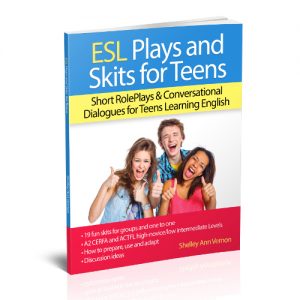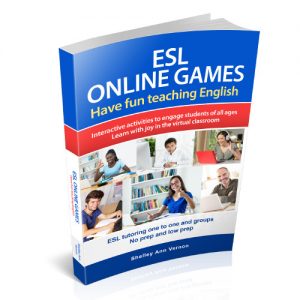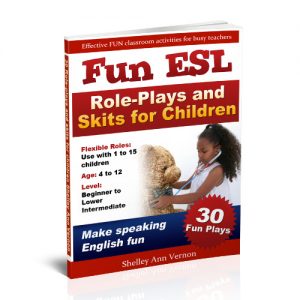An ESL teacher asked me for help with classroom speaking activities for young beginners. Since her students have very little vocabulary and poor pronunciation, she does not know where to start.
Teaching a language is like building. Imagine you are building a house. To build it, you need bricks. With the bricks and cement, you construct the walls. Conversation is like a house. It is made up of individual words (like the bricks). Those words make sentences (like the walls). The finished home is the dialogue.
Start with the key vocabulary words
With this in mind, start by teaching the vocabulary words in your dialogue. I use games for this, starting with listening games like Jump the Line. Next, I move on to classroom speaking activities like these ESL speaking games. You might think that you aren’t getting anywhere, but these steps are necessary. Consider that you are building good foundations for your house!
Introduce short phrases
Next, use classroom speaking activities to introduce short phrases or sentences from the dialogue. Always start with listening games to drill these, so students hear them repeatedly before you expect them to say them.
Work in pairs
Frequently have students practise classroom speaking activities in pairs. Pair and small group work allow everyone to get involved and get their chops around English! Do some reading and writing tasks with the dialogues. If students invent the last two lines of the conversation, that could be interesting, but it would be too slow to implement with complete beginners unless you have tiny groups. Reading puzzles are great, as is a game like Find a Friend, where students each have a part of the dialogue. They have to find another student who has the previous sentence.
Work as a class
Now you have worked with the dialogue a fair bit, try this. Put students into teams. Some students stand and mime the dialogue silently. They act it as best they can, making gestures but never speaking. When the teacher claps, students stop miming. The other teams have to say the following line. This sort of activity can seem intimidating for students to start with, but they will soon get used to it. First, give a demonstration with one of the stronger students so the class understands the task. This activity is beneficial because all students are engaged at once. Students have to mentally follow the dialogue, which helps fluency, even though they aren’t speaking.
If you try this speaking activity, do let me know how it goes! I’d love to hear about it.
Teach dialogue through drama
If you can make a conversation somewhat interesting or dramatic, so much the better. Try using my plays and skits or extracts from them. The dialogues are repetitive and use limited vocabulary, making them ideal for beginners.
Resources to teach a dialogue
If you don’t have my games books, you’ll find lots of games to help you teach vocabulary and sentences, so that you can build towards dialogues. This primary-school-age games book is perfect, even if you have a large class. (Also in paperback.)
I hope this helps – let me know! Looking forward to hearing from you again soon.
Kind regards
Shelley Ann Vernon
-
Sale Product on sale
 Plays and Skits for Teens
Plays and Skits for Teens€19.97Original price was: €19.97.€15.33Current price is: €15.33.Rated 5.00 out of 5 based on 1 customer rating -
 ESL Online Games€19.97Rated 5.00 out of 5 based on 4 customer ratings
ESL Online Games€19.97Rated 5.00 out of 5 based on 4 customer ratings -
Sale Product on sale
 Fun ESL Role-plays and Skits for Children
Fun ESL Role-plays and Skits for Children€19.97Original price was: €19.97.€15.33Current price is: €15.33. -
Sale Product on sale
 ESL Games book for primary & middle school children
ESL Games book for primary & middle school children€19.97Original price was: €19.97.€15.33Current price is: €15.33.Rated 5.00 out of 5 based on 2 customer ratings





2 thoughts on “Classroom speaking activities for beginners”
I would like the book.
Hello there Denovan, Thanks for your comment. You can get my books in PDF download directly on my website, in the shop. And if you prefer Kindle or paperback, then most of them are on Amazon as well.
I have a choice of books for different ages, for online, and for one to one or classes. I can recommend the best one for you if you let me know about your pupils – how old they are, how many you have at one time, and whether you are in class or online.
All the best
Shelley Vernon